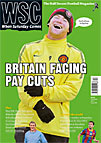 As financial uncertainty looms at Manchester United, Ashley Shaw explores how Wayne Rooney’s interference may have forced the hand of the Glazer family.
As financial uncertainty looms at Manchester United, Ashley Shaw explores how Wayne Rooney’s interference may have forced the hand of the Glazer family.
So the cat is finally out of the bag. Whatever the repercussions of the Wayne Rooney saga, we now know that concerns over the club’s ownership extend into the dressing room. On the face it, United’s American owners have given in to player power at the risk of losing their most saleable asset for a song in the summer.
Yet while Rooney may have hastened the end of his career at United by voicing a widely held fear, in the short term he has breathed life into the Glazer spin machine. According to initial “reports”, Rooney has been promised as many as 11 new team-mates with Wesley Sneijder, Maarten Stekelenburg and Luis Suárez lined-up as potential targets. Meanwhile the managerial succession has been secured with the likes of José Mourinho and Pep Guardiola heavily “tipped”. Supporters are entitled to ask if the clubs involved are willing to accept magic beans as payment.
The striker’s turnaround, just 41-and-a-half hours after accusing United of “lacking ambition” and all but consigning his manager and team-mates to title also-rans, left a bad taste in the mouth, especially as he followed it up by departing for the Dubai sunshine while his colleagues battled away at Stoke. Some have even claimed that this media circus was arranged between manager and player in an attempt to force the owners to fund replacements for imminent retirees, although the manager’s face at his infamous press conference told a different story.
The saga certainly did much to distract from the previous week’s revelation that United registered a loss of £80 million on their 2009-10 accounts thanks to interest and the cost of the bonds issued in January. The Glazers have finally taken United into the red, but even so the financial results threw up more questions than answers. Of particular interest was the owners’ reluctance to take the £95m (soon to rise to £123m, according to andersred.blogspot.com) in dividends to which they are entitled. Have the green and gold protests finally made the owners think before they pillage?
Or are these funds being reserved for player transfers?
Then there is the staggering £163.8m cash in the bank, relating to 57 per cent of turnover. Experts seem baffled as to what the owners will use this money for. It could be being saved up for the next manager, or the owners might take their dividends out before the next accounts to prop up their ailing Stateside businesses. Supporters remain highly sceptical but the arrival of Manchester City as a serious rival may have provoked United’s owners into a policy change.
Of course misery loves company and while United fans have gnashed their teeth at the injustices of the Glazer regime there has always been a crumb of comfort in the soap opera at Anfield. Yet by the time of Hicks and Gillett’s and removal, a significant minority of United fans had put traditional rivalry aside and warmed to the theme of supporters working in close concert with banks, ousting unpopular owners.
Unfortunately, there the similarity ends. The clubs are poles apart in many respects with the Glazers under little threat from the banks with any D-day deferred until at least 2017. The only power supporters could bring to bear is a concerted season-ticket boycott. But although season-ticket sales are down (despite the owners freezing prices for 2010-11) and corporate take-up has also fallen it has not been sufficient to induce the owners into a quick sale, although it may have forced them to modify their behaviour. If anything the Glazers are stronger now than at the start of the summer having successfully fended off the Red Knights.
For all that, United’s owners will soon face a real dilemma. Until now they have avoided all interference in the football side – a policy made possible by their good fortune in inheriting a successful and popular manager and an experienced squad accustomed to victory. However within the next season or so they will be forced to take make-or-break decisions.
Do they invest appropriately to replace the retirees with quality (including making substantial funds available to a new big-name manager) or risk being overtaken for good by the new money flooding the Premier League? If they chose the cheapskate option they run the risk that their investment will take a hit in valuation, while the former may mean forgoing dividends that would prop up their other ailing business interests and lead to more bad press about them taking a previously profitable club deep into the red.
As shadowy as they have been these past five years and as badly as the finances make them out to be, perhaps we haven’t really seen the mettle of United’s owners just yet – the sterner tests are yet to come.
From WSC 286 December 2010